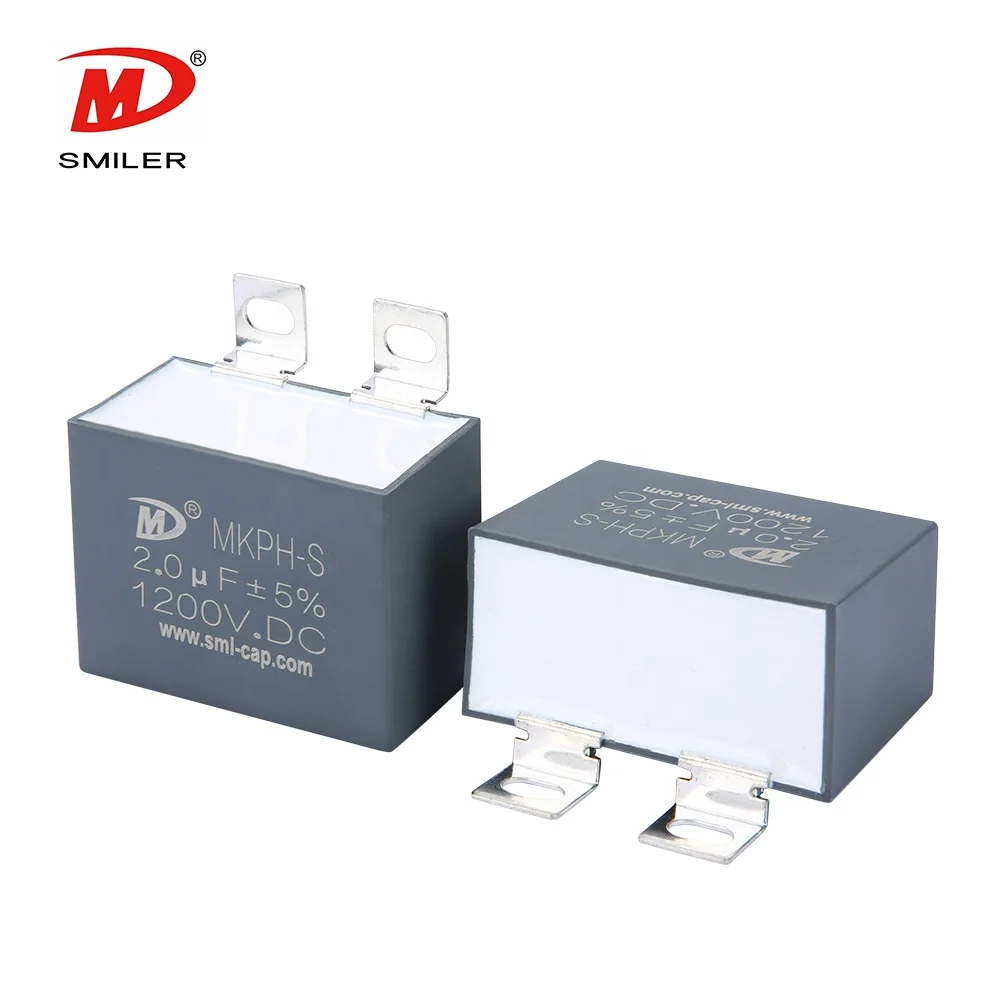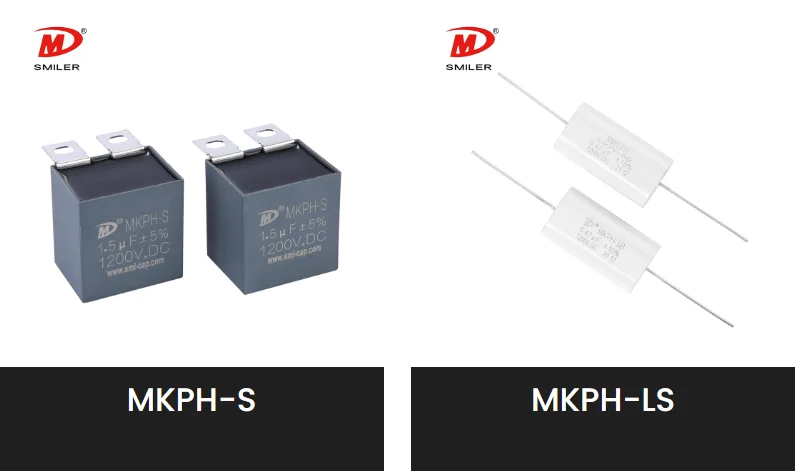 Snubber capacitors are employed to safeguard electrical circuits against voltage spikes which may be caused by abrupt switching operations in the system devices like IGBTs (Insulated Gate Bipolar Transistors). By absorption and dissipation of the energy generated by the spikes, the snubber capacitor shields delicate components against harmful high voltage surges effectively
Snubber capacitors are employed to safeguard electrical circuits against voltage spikes which may be caused by abrupt switching operations in the system devices like IGBTs (Insulated Gate Bipolar Transistors). By absorption and dissipation of the energy generated by the spikes, the snubber capacitor shields delicate components against harmful high voltage surges effectively
Snubber capacitors are specially designed to regulate pulse levels and have very good self repair attributes for durability even in difficult environments, such as surge absorption in IGBT buffer circuits with SMILER's Snubber Capacitor MKPH-S featuring metallized polypropylene film in a plastic case package resin-filled for better protection and reliability.
Energy dissipation plays a role in RC (Resistor Capacitor) and RCD (Resistor Capacitor Diode) snubbers. In the event of voltage spikes these snubber’s function to transform the energy into heat using resistive elements thereby safeguarding other circuit components from potential harm.
SMILER’s snubber capacitors have been crafted to manage overvoltage situations efficiently capable of withstanding instances like 110% of their rated voltage for a portion of the load time or up to 150% for short intervals of around 30 milliseconds repeated up to 1,000 times throughout their lifespan, ensuring safe dissipation of energy without jeopardizing the capacitors integrity or the circuits overall performance.
RC snubbers heavily depend on the effectiveness of their capacitors to operate efficiently. A designed snubber capacitor not only absorbs sudden voltage spikes but also minimizes electromagnetic interference (EMI), which is triggered by rapid switching processes in circuits. The capacitor's capacity to endure dV/dt (voltage change rate) situations is essential for maintaining reliable performance.
For instance, the snubber capacitors of SMILER showcase pulse intensity with peak currents limited by IP= C*dv/dt. Their sturdy construction enables them to handle voltage fluctuations effectively while ensuring stability in different operational scenarios.
There exist elements that impact the effectiveness of an RC circuit that has a snubber capacitor.
1. Capacitance Value: The value of capacitance determines the amount of charge stored and delivered by the capacitor in operation.
2. ESR (Equivalent Series Resistance): Lower ESR reduces power losses and increases efficiency.
3. Thermal Stability: It is the ability to operate in varying temperatures without degradation. It is required for long-term reliability.
4. Voltage Rating: It is durable and safe when operated within rated voltage levels.
 RCD snubbers help in voltage spike management and providing effective operation of electronic systems by effectively controlling energy storage and release dynamics in circuits. The presence of a snubber capacitor brings changes in energy storage and release processes in such circuits because it has the potential to quickly absorb and release energy when needed.
RCD snubbers help in voltage spike management and providing effective operation of electronic systems by effectively controlling energy storage and release dynamics in circuits. The presence of a snubber capacitor brings changes in energy storage and release processes in such circuits because it has the potential to quickly absorb and release energy when needed.
For example, SMILER’s snubber capacitors have been designed such that dv/dt (change in voltage rate) is regulated to store energy during sudden spikes and release it without harming other system components. This is especially important in systems using IGBTs (Insulated Gate Bipolar Transistors), in which high-speed switching operations can cause voltage surges.
The amount of energy that a snubber capacitor can hold will be dictated by the capacitance it has. The greater the capacitance, the greater the energy it can absorb and minimize the occurrence of voltage spikes. The requirements of the circuit design should be taken into account to prevent unnecessary power loss or inefficiency.
The stability of an RCD circuit is highly dependent upon the behavior of the snubber capacitor employed, and it is therefore very critical to select a capacitor to provide effective transient suppression as well as sound long-term operation.
Thermal resistance is another consideration when one is designing snubber capacitors in terms of quality. They should work effectively in various temperature ranges without affecting their performance negatively too much. SMILER’s items can handle temperatures reaching up to +105°C.
Voltage rating is equally important for ensuring safety and longevity. Operating within controlled ranges of voltage prevents dielectric breakdown and extends capacitor life. SMILER’s snubbers are fabricated to withstand from 700VDC to 3000VDC, responding to the requirement of a large variety of configurations of circuits. When engineers use the features offered by SMILER’s snubber capacitor in circuit design, it helps ensure stability and safeguards components from sudden voltage changes.
SMILER’s snubber capacitors are engineered for care in terms of high-quality and long-duration performance. The capacitors incorporate a metalized polypropylene film material that exhibits superior self-healing features and can stand up to extreme conditions with reliability. Their longevities are further improved through the possession of a shell package with resin, filling to assure long-duration immunity against environmental conditions such as vibration and temperature change.
One major benefit of SMILER’s snubber capacitors is that they work well with both RC and RCD snubber setups. Their capability to handle situations of over-voltage efficiently also boosts their appropriateness for setups. These systems can withstand duration of over-voltage instances—for example, exceeding their standard voltage by 10% for about a third of the time they are in use or even reaching 50% above for short instances, like half a second up to a thousand occurrences during their lifespan. This guarantees that power discharges safely happen and safeguard parts from harm.
By using SMILER’s snubber capacitors in your circuit designs, you can improve protection from voltage spikes and increase energy dissipation efficiency while ensuring long term reliability— aspects for boosting the effectiveness of contemporary electronic systems.
A: A snubber capacitor is employed to shield electrical circuits from voltage spikes and to filter out high-frequency noise. It prevents components such as switches and relays from being damaged by absorbing the excess energy.
A: The function of the snubber is to help the semiconductor device at the time of switching transitions withstand voltage and current stresses that cause it to fail. These stresses are generated due to current interruption on turn-off and voltage collapse during turn-on.
A: There are several types of snubbers but the two used most widely are the resistor-capacitor (RC) damping network and the resistor-capacitor-diode (RCD) turn-off snubber. This note will show you how to design these two snubbers.
A: Choose a capacitor with capacitance, voltage rating, ripple current rating, and temperature in mind. The physical size of a capacitor is determined based on the capacitance value. As the capacitance value increases, the size increases. The capacitance variation is temperature-dependent.